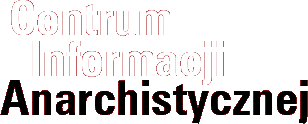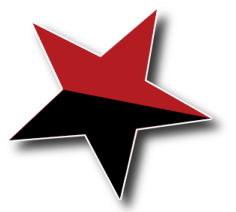Belarussian anarchists show videos of the "Denim Revolution"
Two Belarusian comrades visited Next To Nowhere last night, to show an
Indymedia video of the mass protests in Minsk last year, and to discuss how west
European activism compares to that of the former eastern bloc. --- The video
contained footage from the abortive 'denim revolution' of March 2006, which followed
the re-election of Russia-leaning president Alexander Lukashenko, over his US
and EU-backed rival Alexander Milinkievic(. As the Bush administration alleged
voting irregularities (pot, kettle, black), a large group of protesters set up a
tent city in the October Square, in an echo of what had happened during Ukraine's
'Orange revolution'. However, there was to be no victory for Washington
here, because massive police repression was able to overcome the protests, which
seemed to lack the working class base of their Kiev equivalents.
The comrades explained that though they did not support Milinkievic(, they
were active in the protests against Lukashenko's government, seeing them as an
opportunity to spread their ideas. Indeed, the videos showed quite a few red
and black flags amongst the blue of Milinkievic(. The male comrade was
imprisoned for taking part.
Radical activism and anarchism seems to be in its infancy in Belarus. The
female comrade remarked how there are no social centres in her land, because
activists are frequently targeted by the state. Radicalism in Belarus was strangled in the Soviet Union, and Lukashenko has kept much of the Stalinist apparatus, not
even bothering to rename the KGB! However, the neoliberal 'shock therapy' which
is increasingly attacking the living standards of working people will
inevitably provoke resistance in years to come. For example, on 1st January 2008,
Lukashenko will bring in benefit cuts the like of which Gordon Brown
probably only dreams of.
Students, pensioners and 'veterans of labour' are currently entitled to
half-price fares on public transport. Children under three years old get
free medical care. Former inmates of German WW2 concentration camps are given
free medical and dental treatment and free public transport. Victims of the 1980s
Chernobyl nuclear plant disaster, which affected Belarus more than any other
of the then republics in the USSR, have free medical care, 50% lower rents and
cheap housing credit. Military and police personnel got free medical
attention and annual holidays. In four weeks' time, the only section of Belarusian
society to keep their benefits will be parliamentary deputies!
The enormity of our global task struck me during this meeting. The
generations of working class people in Britain, the US and western Europe who won social gains from their ruling classes are becoming less active and dying off.
Those who survive are mostly tied to the trade union bureaucracy that Thatcher's
children know little of and (rightly) trust even less. Like our young
comrades from Belarus, anarchists in the UK have some theory, but have experienced
nothing except defeat at the hands of the state and its hangers-on.
Of course reinventing the world is not an easy task to set yourself, and it
is by necessity a step into the dark. But in this age of instant global
communication we will learn together, and that is something we went part of
the way towards doing last night.
Many thanks to our guests for coming to Liverpool, and providing us with a
fascinating evening!
Indymedia videos of the 'denim revolution' can be viewed
here [http://video.indymedia.org/en/2006/03/297.shtml] ,
here [http://video.indymedia.org/en/2006/03/304.shtml] ,
here [http://video.indymedia.org/en/2006/03/306.shtml] ,
here [http://video.indymedia.org/en/2006/03/307.shtml] and
here [http://video.indymedia.org/en/2006/03/308.shtml] .






